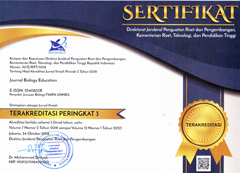Analysis Knowledge Level of Psychotropic-Addictive Substance And Rejection Attitude Of Drug Abuse In Junior High School Students
Abstract
Lack of drug hazard knowledge becomes one of the drug abuse causes. Drug knowledge (psychotropic-addictive substances) will foster a negative attitude such as a rejection reaction towards drug abuse. Such attitudes may prevent or address drug abuse problems. That prevention needs to be done as early as possible by providing knowledge about drugs trough the school educations. This study would find the relationship between addictive and psychotropic substance knowledge with the attitude on drug abuse and how much that constriction in JHS students' attitudes. This research method is a survey method with an analytical observational design. The population in this study was all junior high school students in the Semarang North District with five classes (grade IX) as samples taken from three schools in the sub-district. The data collection measuring instruments used in this study is questionnaires and interviews. The results of this study show that more than 50% of students have high knowledge of psychotropic and addictive substances and have a negative attitude towards drug abuse. Data analysis results are obtained by a correlation coefficient value (r) of 0.971 and a coefficient of determination (R2) of 0.942. The R value indicates a positive correlation while the R2 value is how much constricting it is. Based on the results of the study, concluded that the knowledge of psychotropic-addictive substances with the rejection attitudes of drug abuse has a positive and very strong relationship. And as much as 94.2% of the psychotropic addictive substance knowledge is constricting in the formation of students ' attitudes towards drug abuse.
The copyright of the article once it is accepted for publication shall be assigned to the journal as the publisher. The intended copyright includes the right to publish the article in various forms (including reprints). The journal maintains the publishing rights to the published articles.
This work is licensed under a Creative Commons Attribution 4.0 International License.







